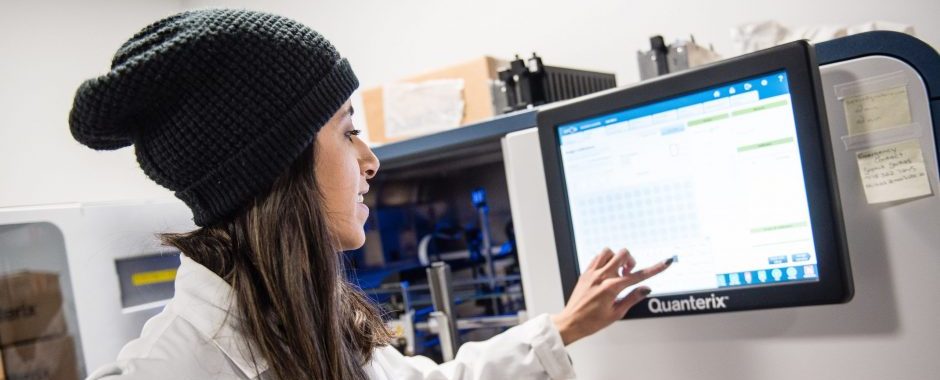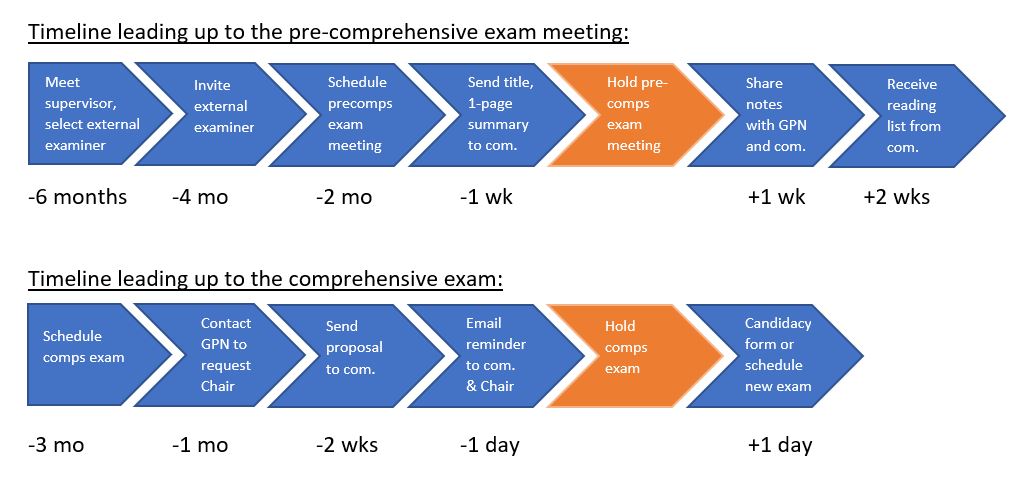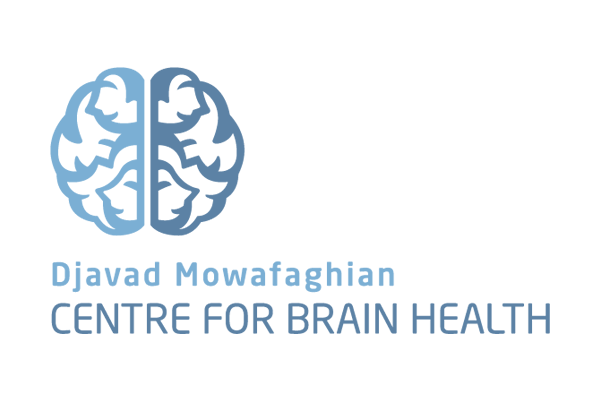
In order to be admitted to candidacy and to continue in the doctoral program, each doctoral candidate must successfully pass a comprehensive examination (the “comps exam”). The purpose of this exam is to ensure that the candidate has comprehensive knowledge in their area of specialization and in related fields of neuroscience and can communicate their grasp and understanding of their chosen field of study and research in English (see UBC Calendar).
As part of the examination, the committee will determine whether the student has developed strong analytical, problem-solving, and critical thinking abilities, breadth and in-depth knowledge in the neurosciences, the required academic background for the specific doctoral research to follow, the potential ability to conduct independent and original research, and the ability to communicate knowledge of the discipline.
Please note comps exams should be scheduled between 9 am and 5 pm Monday-Friday. Comps exams are not to be booked between July 1st and August 31st.
Steps and Guidelines
In the GPN, the comprehensive examination includes two examination formats: a written and an oral examination.
Written Examination
For the written portion of the examination, the student will prepare a 10-page research grant proposal according to the format requirements format requirements of the Canadian Institute of Health Research for Operating Grant applications. This 10-page proposal is submitted to the committee ahead of the oral examination, and it serves two purposes. First, it provides a succinct sample of scientific writing that will be judged on its own. The student should carefully lay out the relevant background information to their question, delineate their aims, the methodologies employed, etc. The goal here is to demonstrate expertise in the candidate’s chosen area of focus, so it is expected that the grant proposal will focus on the same content as the student’s dissertation.
Second, the proposal demonstrates the scope of the applicant’s research to the examiners and sets the frame for the oral examination. Based on the grant proposal, each examiner will provide the student with a few articles or readings that they think are relevant to the proposal. These papers may even already be in the student’s works cited (but the examiner wants to underscore their interest in these works), or they may bring in a related area that is highly relevant to the project but that the student may not yet have included. The student should review these papers as part of the preparation for the oral examination. The scope of the examination will thus be limited to anything covered in the written proposal (the vast majority of questions will come from this) and any new, relevant information contained in the recommended articles.
The topic of the research grant proposal is decided upon by the candidate and their supervisor and is normally based on the candidate’s immediate area of scientific interest. Similar to the process of actual grant-writing, the student should ensure that the introduction and rationale for the specific aims illustrate the breadth and depth of their knowledge of the relevant literature. The key criterion to be applied to the written examination is whether the candidate has a viable and well-considered research program, broadly contextualized within their field of research, and that following this line of research is likely to lead to the generation of a high-quality Ph.D. thesis.
The research grant proposal is used as a vehicle for the comprehensive examination; it forms the basis of the oral examination but is evaluated independently, i.e., passing the oral examination does not necessarily indicate acceptance of the research grant proposal.
Oral Examination
The scope of the oral exam will be discussed and mutually agreed on by the candidate and the examining committee in a preliminary meeting, the pre-comprehensive exam meeting (see below). In the oral examination the candidate may be questioned on any aspect of the research grant proposal and will be asked to elaborate upon or defend issues arising from the literature review and the research plan outlined in the proposal. The range of questioning may include topics that are not discussed directly in the proposal but that are deemed relevant by individual members of the examining committee as discussed in the pre-comprehensive meeting. During the oral examination, the candidate demonstrates to the examining committee that they have a thorough understanding of those areas of neuroscience relevant to their research proposal, can expand on and defend those ideas verbally in English, and have attained sufficient intellectual understanding of the subject matter to proceed with primary research likely to lead to a competent Ph.D. thesis.
The comprehensive examining committee consists of all three members of the supervisory committee (excluding the supervisor), an external examiner to be identified by the student and their supervisor, and the committee chair (coordinated by the GPN program). In the case of co-supervision, the comprehensive examining committee consists of two members of the supervisory committee (excluding the co-supervisors), the external examiner, and the committee chair. The external examiner (external = external to the supervisory committee) may be a faculty member of any rank, who is a G+PS member. Please note that at least half of the members of the examining committee must be G+PS and GPN faculty members (this rule also holds for the supervisory committee). It is generally not recommended to include examiners from outside of UBC. If the candidate’s supervisory committee includes members who are external to UBC, the candidate has to contact the program at ubc.neuroscience@ubc.ca to discuss composition of the comprehensive examining committee prior to scheduling the pre-comprehensive exam meeting.
Whereas supervisors are not required to attend the comprehensive exam, they can be invited with the strict understanding that their role is only to observe. They must not ask questions or speak on behalf of or defend the candidate in any way.
Pre-comprehensive exam meeting
The purpose of the pre-comprehensive exam meeting between the candidate and the examining committee (excluding the Chair) is to set up parameters for the comprehensive exam. The candidate will submit a title and one-page summary (subject to modification) of the research proposal at least one week before this initial meeting (see Timeline below). At the meeting, the Examining Committee and the candidate will discuss and mutually agree upon the guidelines, scope and level of understanding required to complete the written and oral components of the examination satisfactorily.
Among the issues to be clarified are the research topics associated with the proposal that each examining committee member feels the candidate should concentrate on as they prepare for their exam. The candidate will act as secretary at the meeting, and will provide each member of the committee and the GPN office with a written summary of the discussion no later than one week following the meeting; any discrepancies in interpretation should be resolved at this time. The date and time of the oral examination will also be determined at the time of the pre-comprehensive exam meeting and communicated to the committee and GPN office. Each member of the examining committee will supply the candidate with a short reading list of research papers (typically five on average) for their suggested topic within two weeks of the pre-comprehensive exam meeting.
Due date of research grant proposal
The due date for the research proposal will be set at this meeting and will be no later than three months following the pre-comprehensive meeting. The approximate date of the oral component of the comprehensive examination will also be determined at the preliminary meeting, and in all cases will be within 14 days of the candidate submitting a copy of the completed grant application to each member of the examining committee. Because the available time window for the oral examination is very narrow, the candidate and the committee are encouraged to find an exact date and time for the oral exam at the time of the pre-comps meeting.
The supervisor may provide guidance and feedback to the candidate in the preparation of the research grant proposal. However, the research proposal should be written by the candidate. As with CIHR grants, if the candidate fails to meet the deadline for submission of the research grant proposal (by more than a grace period of 12 hours, which can be applied in exceptional situations such as documented, severe illness) the comprehensive examination will be automatically postponed for six months, and the process will start over with a new pre-comprehensive exam meeting, during which new or additional topics of study and preparation have to be agreed upon. The candidate is encouraged to submit their research grant proposal with a margin of at least one day to avoid this situation.
Timeline
Normally, the comprehensive exam will be completed once all coursework has been completed, and by the start of the third year of enrolment in the PhD program. The following timeline must be followed to prepare for the comprehensive examination. Please note that the time window for the oral examination ends within 3 months and 2 weeks of the pre-comprehensive exam meeting. The committee must be given two weeks to review the research grant proposal.

Timeline troubleshooting
Occasionally, a supervisory committee member may decide to leave the committee after the pre-comprehensive committee meeting, or opt out of the comprehensive exam. Typically, this happens if a major change in topic has occurred and if the supervisory committee member no longer feels that their expertise is relevant. Even though these situations are relatively rare, it is a good idea to attempt to avoid them or be prepared for them. It is vital to have regular (at least annual) supervisory committee meetings leading up to the pre-comprehensive committee meeting, and to ensure that all committee members are aware of any changes to the thesis topic or field of research.
Should a supervisory committee member decide to leave after the pre-comprehensive committee meeting, the candidate should immediately notify the GPN coordinator to determine next steps. Usually, the comprehensive examination can still go forward with the original timeline, because only three examiners (in addition to the Chair) are needed, and one of them is the external examiner. The student and supervisor can replace the supervisory committee member without requiring that this member also participates in the comprehensive examination (even though this would be desirable).
Should an additional examiner or a new external examiner be needed for the comprehensive exam, the GPN coordinator and director will consult with the student and supervisor to have this committee member replaced as soon as possible. The student would then be asked to meet with the new committee member one-on-one to determine the scope of work for the written and oral examinations.
If an examiner is not able to participate in or misses the comprehensive examination, the exam can still go ahead as long as three examiners and the Chair are present. (The missing member can optionally submit their questions by email.) If fewer than three examiners are present, the examination may be rescheduled once, within a 1-week grace period. Contact the GPN coordinator immediately, if this problem occurs.
In the unlikely event that the comprehensive exam has to be re-scheduled beyond three months of the pre-comprehensive exam meeting, the candidate may choose to confirm by email that the outcomes of the original pre-comprehensive meeting are up-to-date. The email is to outline (a) the student’s thesis proposal goal and aims, (b) the topics suggested to them by their committee, and (c) a detailed reading list that was originally supplied to them by their committee. Confirmation is required by all members of the comprehensive exam committee that the topics / readings are still up to date, and that the student can move forward with writing their thesis proposal and studying for their comprehensive exam. Please note that rescheduling is not recommended, and that the decision to allow rescheduling the comprehensive examination without a full pre-comprehensive meeting is at the discretion of the GPN Program Director. Under exceptional circumstances that necessitate rescheduling, the candidate must immediately reach out to the program for guidance.
A comprehensive exam is typically scheduled for two hours. The Chair calls the meeting to order and then assure that each member of the committee has had sufficient opportunity to read the proposal (two weeks), and reminds all members of the committee of the scope and purpose of the examination. The Chair then determines the order in which the examining committee questions the candidate, usually starting with the external examiner, and specifies that the approximate length of time for each examiner is 15 minutes in the first round of questions, and no more than 10 minutes in the second round.
The exam then commences with a 20-minute presentation by the candidate, in which they are asked to provide an overview of their research grant proposal. Following are typically two rounds of questions, in which each committee member has the opportunity to ask questions related to (a) the candidate’s project and progress based on their thesis proposal and the oral presentation, (b) the additional readings provided, and (c) the broader Neuroscience context of the proposed PhD project.
In case the candidate failed to achieve a mark of 80% or higher in NRSC 500 or 501, the Chair will ask questions regarding course content, and the committee will assess, based on the answers, if the student has gained sufficient basic neuroscience knowledge to advance to candidacy.
Committee members are encouraged to ask questions until they are able to fully assess the candidate’s advancement to candidacy, within a reasonable time frame as provided above. After the final round of questions, the candidate is excused from the room and the committee deliberates the candidate’s advancement to candidacy. The examination is pass/fail: each examiner (including the chair) is asked to rate the student’s performance.
If all members of the committee rate the student's performance in the oral part of the examination as a “pass”, the student is called back to the room and informed of the committee’s decision. At this time, the student should also be given constructive feedback on specific areas of strength and weaknesses. If a minority of members of the examining committee rate the student’s performance as a “fail”, the student should be informed that they have attained a conditional pass, and that further examination on a subset of the topics covered is required. Because this situation is rare, the committee is given considerable latitude in designing such remedial work as it sees fit. If the majority of members (50% or more) rate the student’s performance as a “fail”, the student has failed the first sitting of the comprehensive examination, and they must re-sit the exam within six months’ time. If the student fails the second sitting of the comprehensive examination, they must withdraw from the program. No student is permitted to sit this examination more than twice.
Similarly, the committee rates the thesis proposal as “pass” or “fail”. If the research program is sufficiently well designed, the research proposal is accepted (pass). If it is not sufficient, then the examining committee may suggest re-evaluation of the thesis proposal by the supervisory committee (conditional pass or fail). The candidate is admitted to candidacy following obtaining a passing grade in the comprehensive examination and acceptance of the thesis proposal by either the examining or supervisory committees.
Following the comprehensive exam, the candidate either fills out an Advancement to Candidacy Form (in case of a pass) and sends it to ubc.neuroscience@ubc.ca, or (in case of a fail) schedules a new exam.
Candidates are allowed one examination adjournment or retake, provided that they have the opportunity to complete the examination within the first 36 months of their program. An adjournment would typically happen if the candidate takes ill during the examination and is unable to continue, or if the candidate is unable to maintain focus or concentration. If the candidate is allowed to resume the adjourned examination at a later date, they will be informed immediately by the Examining Committee as to the conditions for resuming the examination. These conditions include:
• Time frame: typically, an adjournment should occur within one week, or as soon as the candidate is well again; it has to occur within 6 months
• Potential dates: the committee will agree on a date that works for all committee members, and inform the student, provided that this date is within the agreed-upon time frame
• Nature of the re-examination: typically, the examination would resume where it was left off (e.g., continuation of questioning)
• Committee: the examination committee membership usually remains unchanged for the subsequent examination.
Similar steps are followed if the candidate fails their first attempt at sitting the comprehensive examination. If this occurs, the Examining Committee (or Graduate Program Director) must inform the student in writing of the outcome, and of the consequences of a potential second failure. The committee will then outline the conditions of the retake, including the time frame / date, nature of the retake, and committee membership. A retake must be scheduled within 6 months of the first comprehensive examination.
The Chair represents the GPN on the examining committee, and serves the functions of monitoring and reporting. The Chair also represents the candidate and ensures that the examination process is fair.
At the comprehensive exam, the Chair has the prerogative of asking questions. In the event that the student has not achieved a score of first class (80% or above) in either NRSC 500 or 501, they will be required to answer questions regarding these core courses at the comprehensive exam. These questions, if applicable, will typically be asked by the comprehensive exam Chair.
Throughout the examination, the Chair should ensure that questioning is fair and relevant, and that the candidate has adequate opportunity to demonstrate their knowledge of the field. During the deliberation process, the Chair votes along with the other committee members.
After the comprehensive exam, the Chair fills out the Chair Report for Comprehensive Exams
form and emails it to ubc.neuroscience@ubc.ca. If the Chair report includes suggestions for improvements, especially if the thesis proposal is only rated as a “conditional pass”, the candidate and their supervisor should be cc’ed on this email.
Meetings maybe conducted in-person or over Zoom. Hybrid meetings (where some people are in-person and other people are attending remotely) is not allowed.
Best practices for students:
- when seeting up a Zoom meeting make the comprehenive chair an alternate or co-host and set up a break-out room for the deliberation component of the meeting
- remind all members about the meeting within a week of the exam date with location information
- ensure the chair has your phone number to troubleshoot issues if needed
Students who hold an appointment (such as a RAship or TAship) are eligble for a licensed UBC Zoom account: UBC Zoom accounts


